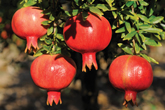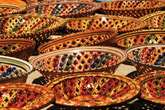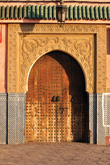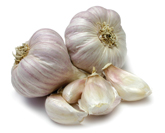×


We have detected your country as:
Please click here to go to the USA website or select another country from the dropdown list.

{image_1} Have you ever opened a pomegranate and marveled at the mass of sparkling rubies one finds? Almost like opening a treasure chest with great expectation, and there—glistening in the light—are tiny clusters of gems. One can only be in awe of the intricacy of God’s creation. Quite regal in appearance with its crown prominently displayed, the pomegranate is one of the seven species of the land of Israel (Deut. 8:8). It is the fruit that ripens in September, heralding in Rosh HaShana, the Jewish New Year. Pomegranate trees throughout the Holy Land are laden, and there is an expectancy of hope and joyous celebrations.
Continue Reading »
{image_1} Since Israel gained statehood in 1948, the Jewish people have returned to their native soil in waves, bringing millions into the Land from all over the world. Israel is not just a country, but a national and religious homeland. After thousands of years of forced exile, the freedom to make aliyah (immigration) is the answer to the millennia-old collective cry of the Jewish heart. Israel has, indeed, become a melting pot with over 120 nationalities represented among its citizenry, and over 80 languages spoken among them.
Continue Reading »
{image_1} The question has been asked time and time again: Was it really an apple back there in the Garden? When Eve fed Adam that single bite that would change the world, was it the sweet, crunchy fruit we have all enjoyed since childhood or was it, in fact, something else?
Continue Reading »
{image_1}
One of the many pleasures afforded to those who visit Israel is the opportunity to feast on foods influenced by Jewish immigrants from over 100 nations who now make Israel their home. Much of Israeli cuisine is, in fact, an amalgam of culinary delights from around the world, and many dishes bring with them as much history as they do flavor. One such tasty item is our recipe from Tunisia.
Continue Reading »
{image_1}
When God spoke the words recorded in Genesis 12:3, “…and in you all the families of the earth shall be blessed,” He wasn’t just speaking of the Messiah as many Christians think. The modern state of Israel has been at the forefront of innovation in countless areas of human endeavor, benefiting the world with advances in medicine, science, technology, the environment, security, and more. However, one Jewish contribution that has impacted humanity for centuries is often left off the list: chicken soup!
Continue Reading »
{image_1}
I don’t believe there’s anywhere in the world that honors the Sabbath like Israel does. Since most businesses are closed for the day, it’s almost impossible not to participate in this day of rest. The quiet is so wonderful! As busy a city as Jerusalem is, with all its horn-honking traffic jamming its narrow streets, one marvels that it’s possible for such a city to almost come to a halt. Does New York City or Tokyo or London ever rest?
Continue Reading »
{image_1}Although the current leader of Iran speaks often of his hatred for the Jewish people, his country is home to one of the oldest Jewish communities in the Diaspora (countries outside of Israel) with historical roots that reach back to the sixth century BC when the Southern Kingdom of Israel fell to Babylon. In 539 BC, King Cyrus of Persia conquered Babylonia and issued a special decree allowing the Jewish exiles form his entire kingdom to return to Israel. This officially ended the first exile. It did not, however, mean the end of these Diaspora communities. Many Jews had become established in their new homes and chose to stay rather than return to an unknown and possibly hostile situation in Israel.
Continue Reading »
{image_1}Arguably, one of the least appreciated foods throughout human history has been the eggplant. Originating in the southeast Asian region that is today India and Pakistan, it was domesticated over 4,000 years ago. Since then, it has spread throughout the world and has met with a wide variety of reactions on its journey. The first written record of the eggplant comes from China about AD 500 where it is described as “the food of emperors.” The Chinese developed their own unique varieties, coming up with smaller fruited plants as well as differing shapes and colors. In the eighth and ninth centuries, the eggplant appears in the Middle East as far west as Egypt and northward into Turkey where it became exceptionally popular. The Turks alone are believed to have over 1,000 native recipes using eggplant in a wide variety of ways.
Continue Reading »
{image_1}After the destruction of the Temple in AD 70—followed 60 years later by the Bar Kochba rebellion—the practice of Judaism was forbidden in Israel. Although Jewish people who remained continued to practice their religion in secret, it was impossible for Jerusalem to continue as the center of religious creativity. Eventually, it was replaced by Babylon. It was here that the gaonim (geniuses) of Judaic thought developed the standard edition of the Talmud (rabbinic commentary), known to this day as the Babylonian Talmud.
Continue Reading »
{image_1}Israel is an amazing country in many ways, one of which is the diversity of its population. The “average Israeli” may have come from Asia, Africa, Siberia, or Florida, bringing along customs and cuisine as varied as the countries themselves. Each of these communities has contributed to the exciting cultural landscape of modern Israel, making it a true melting pot of nations. One such contributor is the Jewish community of Yemen.
Continue Reading »All logos and trademarks in this site are property of their respective owner. All other materials are property of Bridges for Peace. Copyright © 2025.
Website Site Design by J-Town Internet Services Ltd. - Based in Jerusalem and Serving the World.